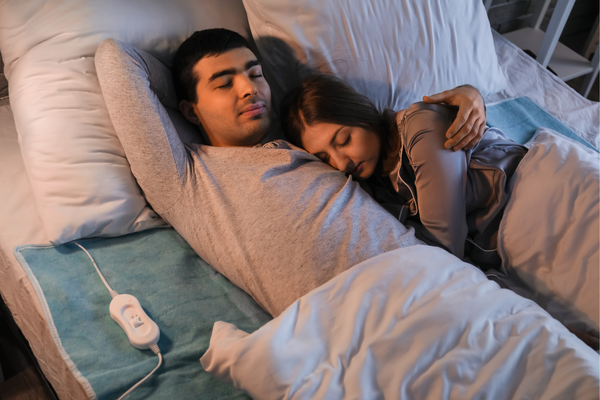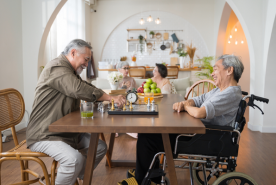February 09, 2023
This Valentine's Day, get your loved ones with kidney disease, kidney failure, or a transplant something they really want. We asked our followers on social media and our volunteer patient advocates (Kidney Advocacy Committee (KAC) members) what products they couldn't live without, and they delivered. Here are six gift ideas approved by those living with chronic kidney disease or caregivers.
1. Blood pressure monitor

Uncontrolled high blood pressure is a leading cause of kidney failure in the U.S., but knowledge is power. Knowing your blood pressure numbers can help determine if diet and exercise changes are working while providing invaluable data for your healthcare professionals.
That's why one KAC member recommends everyone has "a home blood pressure monitor."
Hundreds of home health monitors are available for purchase; some use blood pressure cuffs, while others look and act more like watches. Speak with your healthcare provider to determine which FDA-approved blood pressure monitor is best for you.
Learn more about high blood pressure and kidney disease.
2. Programmable medication dispenser

Taking medication as recommended by a healthcare provider is one of the most important things someone with kidney disease can do for their health. Unfortunately, that can be easier said than done.
"I believe the most important product is your medicine. We tend to forget sometimes but you need to be consistent," said one of our volunteer patient advocates. "This is your life we are talking about and missing one or two medication times can definitely throw your body off whack."
To help you stay on track, this patient recommends "An electronic medication dispenser that can be programmed via cell phone to match the timing of the myriad transplant medications and notify caretakers of compliance. This is a game changer that everyone should know about."
3. Electric warmers

Some people who undergo dialysis may feel cold, especially during treatments, for a myriad of reasons, including:
- Anemia
- Blood cooling as it goes through the dialysis process before returning to the body
- The temperature of the dialysis center
- Skin exposure to reach the fistula, catheter, or graft
- Sitting still for extended periods
To help mitigate feeling cold, those on dialysis recommend electric warmers that come in the form of blankets or clothing items.
"A heating pad," said @katie.tsutli. "I do peritoneal dialysis and it hurts, but a small pad between my blankets makes it better."
"Electric blanket or electric mattress heater, an electric foot heater, and stick-on body warmers help heat my whole body," said a kidney transplant recipient. "I also love my small down throw blanket for camping that folds down into its own pocket to be easily tossed into any bag. These are life-changers that are crucial for dialysis patients and those with low temperature, low circulation, and pain."
4. Candy

Yes, you can get your loved one candy for Valentine's day–it just has to be the right kind, like sugar-free gum, mints, and hard candies.
"This is going to sound silly, but sugar-free gum," said a transplant recipient. "After my transplant, I was constantly hungry because of my medications but chewing sugar-free gum helps the craving to eat more."
"Mints to help remove the metallic taste in my mouth due to disease and medications" were also suggested by a volunteer patient advocate.
5. Dialysis-friendly clothing

Wearing suitable types of clothing helps make dialysis more enjoyable and comfortable.
"I bought my Grandpa jumpsuits designed with the dialysis patient in mind. They have various zipper access points for the patient to be able to receive treatment while remaining fully clothed," said a KAC member. "He loved this because he was always cold at dialysis, and this allowed the dialysis nurses to gain access to his port at the beginning of his dialysis journey, and then access to his fistula once it was matured, simply by unzipping the zippers at different access points. He absolutely loved his suits."
"A sleeved blanket helps me stay warm while keeping my hands free," said @msjnyn.
"My daughter loves wearing adult onesies to dialysis. It's a little bit of home comfort," said @kimm_takemori.
6. Electronics: tablet, headphones, and apps

Whether your loved one has to pass the time while waiting at a doctor's office or during dialysis, electronics like tablets, headphones, and apps can help. They are also useful tools that can keep track of nutrition or exercise and make it easier to share that information with the healthcare team.
These items help so much that six of our volunteer patient advocates recommended them:
"My tablet was a lifesaver. I could pass the time watching movies or tv shows as well as read books."
"An audiobook subscription helps me when I’m bored.”
"Sleep apps help me sleep."
"My tablet and noise-canceling headphones help pass the time in dialysis."
"A health app makes it easy to keep all my info up to date with allergies and what medications I need."
"Comprehensive food list apps help me sum up total macronutrients, like protein, each day."









